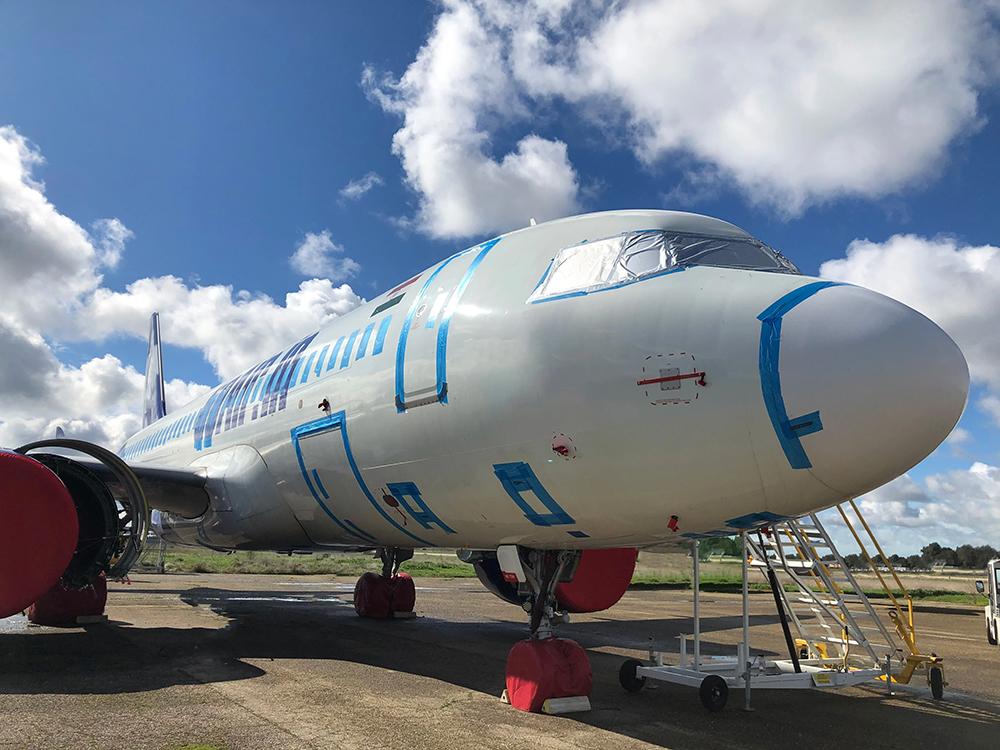
ATLANTA—The used serviceable material (USM) market has been booming in recent years, driven by supply chain issues and new aircraft delivery delays. But aftermarket parts suppliers are now scrambling to predict how U.S. tariffs and the developing trade war could disturb dynamics.
At Aviation Week Network’s MRO Americas event this week, Lufthansa Technik announced it was launching a dedicated used serviceable material business in the U.S. and Airbus signed a deal with VAS Aero Services to tear down and redistribute USM from three A380s. Earlier this month, Unical Aviation acquired a fleet of A320neo airframes that will be disassembled by ecube, and Setna iO purchased multiple A320 family engines for disassembly.
During a panel discussion April 9, executives from USM providers shared reactions to how tariff uncertainty might impact business.
Setna iO CEO David Chaimovitz noted that he has been seeing normalization of the supply chain, but he expects tariffs to potentially throw a wrench into market dynamics.
“I see the tariffs causing major issues if they're not resolved shortly,” said Chaimovitz. For example, if Setna iO buys a teardown asset located in the UK, he said the company would have to “parse through every single line item to determine where it was manufactured” and make decisions about which global facility it should be shipped to in order to minimize tariff impacts.
“We’re kind of hamstrung at which repair shops we could choose to use for the repairs,” he added. “If it's a French made part, we cannot send it to America unless we immediately export it, which will definitely cause more challenges, supply chain issues and a ton of complexity to the business, so I'm not thrilled about that.”
“It’s funny to hear that we’re not the only ones trying to figure our way through this,” added David Dicken, executive vice president of asset management at Unical. “We have weekly meetings. It seems like things are changing every single week, [so we are] trying to wrap our heads around what is the flavor of the week. I think we're all just trying to navigate and figure out the true impact.”
Jacqueline Fernandez, AerFin’s senior vice president for the Americas, told attendees the company has been talking to contemporaries about their perceptions of the situation. “Uniquely for us, our origins are in Europe, and we've got our headquarters in Wales and in London, but recently, now we've got our facility in the U.S. We transited containers [and] sea freight to the U.S. facility prior to this, and the dismantles that we have going on this year are already stationed here in the U.S. as well,” she said. “So, it's a wait and see for us, but we do think we will be a little more protected than some of our contemporaries that have single locations, whether they’re in the U.S. or in Europe.”
According to David Chriske, president of Chromalloy Material Solutions, the company has “a lot of materials coming in from China,” so if 104% tariffs on that country stick, “that’s a game changer.” The company also has several overseas facilities, so he noted that it may need to start questioning if they are economically sound options in the face of potential 40-45% tariffs, “even if I pass it on to the customer. It’s just a massive disruption,” he said. “We all would like it to go away as soon as possible, but we’re just kind of living day to day.”
He added: “Our legal team is trying to sort through the uncertainty and confusion. One of the big things right now is [whether] these new tariffs have kind of killed the aviation exemption. There’s always been this aviation exemption in a lot of places. That’s gone now.”
When asked whether line replaceable units (LRU) would also be subject to tariffs, Chaimovitz said he believed this was likely the case, “which is interesting because, say you buy an aircraft, you spend a million dollars on it and you export half the parts into America. Are they [the tariffs] the high dollar parts? Are they the low dollar parts? It’s very unclear.
“If you bring in an LRU that’s serviceable and worth $50,000, you don't know the condition of it off a teardown. And if it’s BER [beyond economical repair], I think it's reasonable to put $100 worth of value—you could make that argument,” he added. “It’s extraordinarily unclear, and it'll be impossible to enforce and police. I think there are going to be people ending up in courts for this one day if this stands for much longer.”
When asked whether economic impacts from the trade war could soften travel demand and have knock-on effects on the USM market, Chaimovitz pointed out how the uncertainty has resulted in a huge decline in oil prices, so he expects ticket prices to drop significantly.
“If there is a slowdown in global travel and there are more [aircraft] retirements, which I think is very possible, you're still talking maybe 100 extra aircraft a year,” which “the USM market could suck up, no problem,” he said. Considering all the new aircraft delivery delays, “There’s still going to be tons of demand to buy aircraft parts,” added Chaimovitz.





